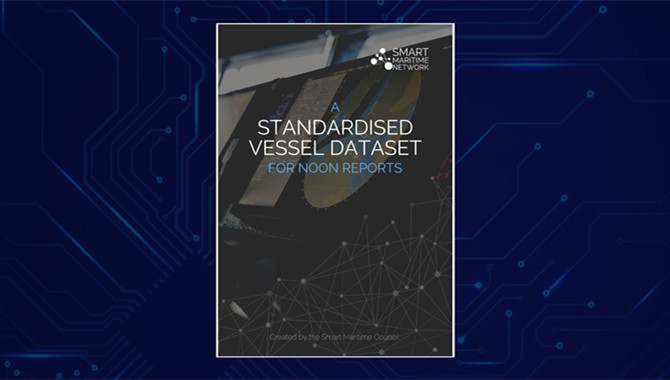
A Standardised Vessel Dataset (SVD) for Noon Reports has been launched by the Smart Maritime Council following the completion of a proof-of-concept project involving vessel operators OSM Maritime, Thome Group and V.Ships, offering a non-proprietary list of standard data points that can be freely applied by any maritime industry stakeholders to simplify data collection and analysis.
Working from a standardised list created by the Smart Maritime Council in collaboration with Stolt Tankers, the project saw Noon Report data from individual vessels operated by each of the three shipmanagers mapped to the central standard and then exported as XML data files in the same common format.
The standardised data from the different companies was shared with Lloyd’s Register (LR), acting as the technology partner on the project, and uploaded into one of its software platforms adapted to accept the standard format for analysis, eliminating the need to run a separate translation procedure for each individual operator.
With this step, the proof-of-concept project was successfully completed, delivering a standardised set of data points covering common items within the Noon Report that allowed information from three different shipping companies to be collected in a standard format and successfully imported into a software application for analysis without any further customisation.
“Thome Group has supported this industry initiative from day one, as we believe that, along with onboard inventory control, the lack of a standardised Noon Report is one of the most consistent problem statements from our fleet colleagues and performance analysts,” said Peter Schellenberger, Vice President Supply Chain, Thome Ship Management.
“It will also free up precious time for our colleagues on board and prevent mistakes from happening. It is the key for better transparency in client reporting and a great chance for industry stakeholders, established supply partners as well as start-ups, to develop added value smart solutions based on a standard data set.”
The SVD for Noon Reports has now been made available as an open list of standard data points for vessel operations, freely available to download and apply by any maritime industry stakeholders. The list has been initially released as a ‘beta’ version for comment and feedback from potential users outside the Smart Maritime Council membership, to allow interested parties to suggest updates and additions to the standard before a full ‘version 1.0’ is released later this year.
“The maritime industry, as a whole, stands to significantly benefit from widespread adoption of standard formats in the collection of vessel operational data, reducing the time and resources wasted in converting each ship operator’s own data into the variety of different formats required by application providers,” said Rob O’Dwyer, Chairman of the Smart Maritime Council.
“If shipping companies can map their own data to a standard format, they can immediately share that data with any application that supports the same standard without the need for further customisation. This will reduce the cost involved in data analysis while improving vessel operators’ ability to choose different software providers and more easily move their data from one to another.”
“The resources wasted on customised mapping projects to translate all of the disparate data formats currently in use can then be re-invested into improving maritime analytics programs to create additional value for users, improving vessel efficiency while also reducing the costs involved in accessing performance optimising applications.”
The initial version of the SVD for Noon Reports already incorporates a number of open international standard formats applying to the items included in the Noon Report list, such as those used by the Digital Container Shipping Association (DCSA) in its published JIT Port Call Data Definitions and Standards for Operational Vessel Schedules. The Port Information Manualproduced by the International Taskforce Port Call Optimization (ITPCO) was also used as a reference.
The naming structure described by ISO 19848 (Ships and marine technology — Standard data for shipboard machinery and equipment) was adopted to develop ID tags for the data points in the project, with new IDs using ISO 19848’s URL-style structure created for items not originally listed in that standard.
Other existing standards, such as UN Locode for port identification, were additionally incorporated into the Noon Report list, while common ISO standards such as ISO 8601 (Date and Time Format), ISO 19018 (Ships and marine technology — Terms, abbreviations, graphical symbols and concepts on navigation), and ISO 80000 (Quantities and units) were adopted where applicable.
The Standardised Vessel Dataset (SVD) for Noon Reports is available to download for free
from the Smart Maritime Network website, along with a white paper outlining the project and further supporting resources for application of the standard.
The Smart Maritime Council is a cross-industry membership group focused on improving technology harmonisation, standardisation and interoperability in the sector. Members include: ABB; ABS Wavesight; AMMITEC; Anglo-Eastern; BSM; ClassNK; Cobham SATCOM; DNV; Dualog; GTMaritime; Ince; Inmarsat; Intelsat; KVH; Lloyd’s Register; Monohakobi Technology Institute (NYK Group); NAVTOR; Oceanly; OneWeb; OSM Maritime Group; P&O Maritime Logistics; Seaspan Corporation; SEDNA; Sperry Marine; ST Engineering; Stolt Tankers; Thome Group; V.Group, and Wärtsilä.
The opinions expressed herein are the author's and not necessarily those of The Xinde Marine News.
Please Contact Us at:
media@xindemarine.com


 Ningbo Containerized Freight Index Weekly Commentar
Ningbo Containerized Freight Index Weekly Commentar  Ningbo Containerized Freight Index Weekly Commentar
Ningbo Containerized Freight Index Weekly Commentar  Ningbo Containerized Freight Index Weekly Commentar
Ningbo Containerized Freight Index Weekly Commentar  BIMCO Shipping Number of the Week: Bulker newbuildi
BIMCO Shipping Number of the Week: Bulker newbuildi  Ningbo Containerized Freight Index Weekly Commentar
Ningbo Containerized Freight Index Weekly Commentar  Ningbo Containerized Freight Index Weekly Commentar
Ningbo Containerized Freight Index Weekly Commentar